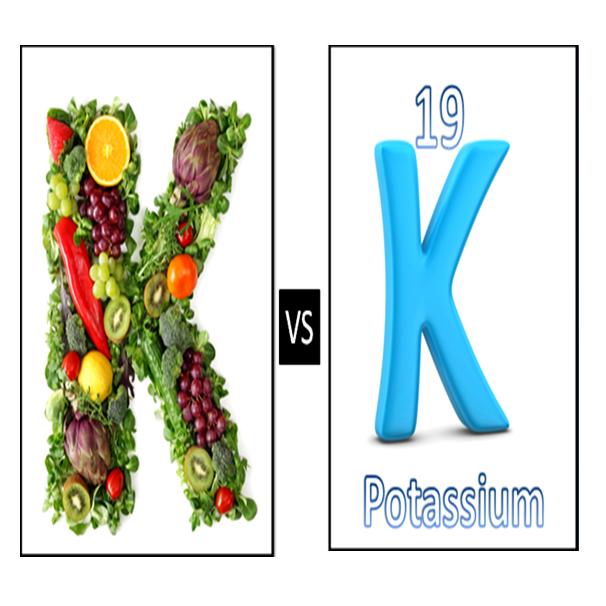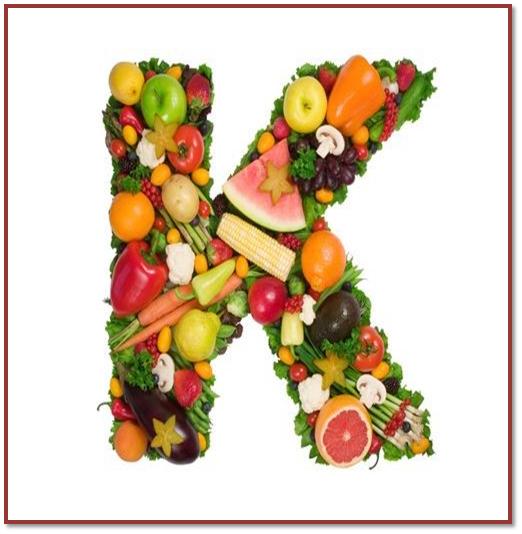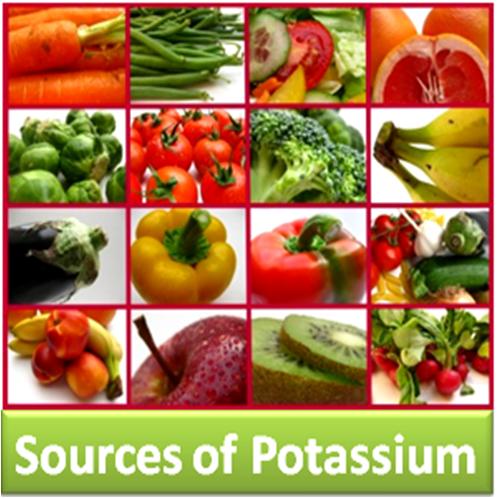Difference Between Vitamin K and Potassium

Potassium and Vitamin K are two of the essential elements for a healthy diet. However, they are usually confused with each other due to the chemical symbol of potassium being “K+”. In reality, they are considerably different nutrients that carry out different functions in the human body. Although, it is essential to maintain a healthy balance of each nutrient, a little confusion between them can result in unwanted consequences. They have totally different functions in the body. In short – apart from the symbol “K”, there is no similarity between vitamin K and potassium at all.
Vitamin K is a vitamin (an organic compound), whereas potassium is a macro mineral (solid inorganic substance).
High dosage of vitamin K does not usually have severe effects, except in a situation where an individual is administered anticoagulants (a substance that averts blood clotting). High dosage of potassium on the other hand, can be fatal, causing mental confusion, heart attack and low blood pressure etc.
Instructions
-
1
Vitamin K
Vitamin K, also known as Phylloquinone, is defined as “a collection of fat soluble vitamins”. Derived from 2-methilo-naphthoquinone, it is a nutrient that the human body stores in the liver and fatty tissue. Vitamin K1 (phytonadione, phylloquinone), vitamin K2 (menaquinones) and vitamin K3 are the natural and structurally similar forms of this mineral. Vitamin K serves a number of essential functions in our body. It helps in blood clotting, ensures healthy bones, prevents calcification, assists in protein modification, protects cells from oxidative stress, possesses anti-inflammatory properties and improves the nervous system. Green beans, kale, parsley, Swiss chard, sage, oregano, cabbage, celery, sea vegetables, tomatoes, curry, Brussels sprouts, collard greens, asparagus, broccoli, oregano, mustard greens, turnip greens, thyme, cucumber, leeks, blueberries, tomatoes, spinach, cauliflower, prunes, chilli powder, cayenne and paprika are some rich sources of Vitamin K.
Image Courtesy: najmama.aktuality.sk
-
2
Potassium
A chemical element by nature, potassium is represented by the periodic table symbol “K”. it is basically a mineral and a primary electrolyte (positive charge), with an atomic number of “19”. It is found in the blood and in other fluids in the human body. This essential nutrient performs some extraordinary functions in our body. It manages blood pressure, keeps the heart functioning smoothly, helps our nervous system, maintains electrolyte balance in the cells, facilitates muscle contraction, relieves the waste removal process (urinary system), lowers cancer and obesity risks, improves muscle control and stabilizes blood pressure. Potatoes, avocados, tomatoes, oranges, bananas, strawberries, raisins, prunes, dates, apricots, spinach, white beans, peas, dark leafy greens, salmon and white mushrooms are the most excellent sources of potassium.







